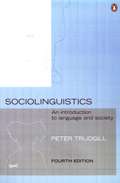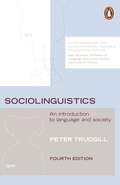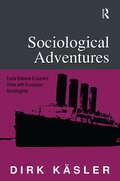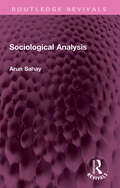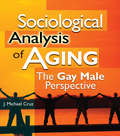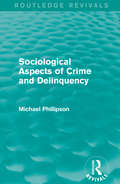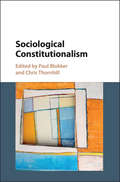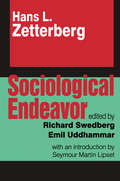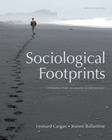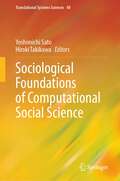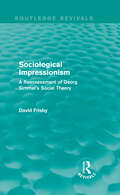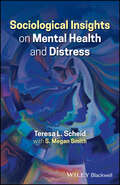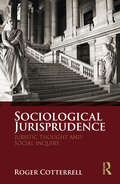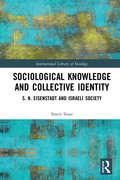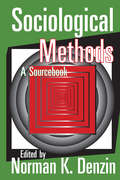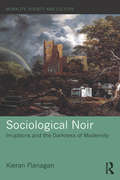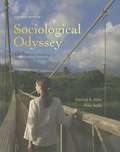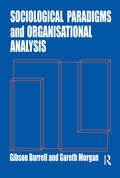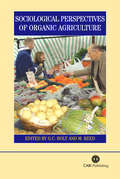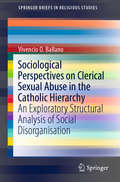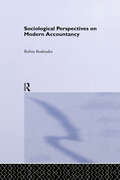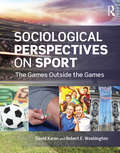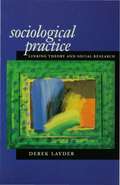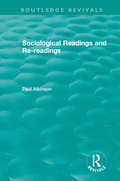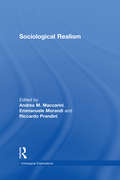- Table View
- List View
Sociolinguistics: An Introduction to Language and Society
by Peter TrudgillThis is a classic book on a fascinating subject. Peter Trudgill examines the close link between language and society and the many factors that influence the way we speak. These range from gender, environment, age, race, class, region and politics. Trudgill's book surveys languages and societies from all over the world drawing on examples from Afrikaans to Yiddish. He has added a fascinating chapter on the development of a language as a result of a non-native speaker's use of it. Compelling and authoritative, this new edition of a bestselling book is set to redraw the boundaries of the study of sociolinguistics.
Sociolinguistics: An Introduction to Language and Society
by Peter TrudgillThis is a classic book on a fascinating subject. Peter Trudgill examines the close link between language and society and the many factors that influence the way we speak. These range from gender, environment, age, race, class, region and politics. Trudgill's book surveys languages and societies from all over the world drawing on examples from Afrikaans to Yiddish. He has added a fascinating chapter on the development of a language as a result of a non-native speaker's use of it. Compelling and authoritative, this new edition of a bestselling book is set to redraw the boundaries of the study of sociolinguistics.
Sociological Adventures: Earle Edward Eubank's Visits with European Sociologists
by Dirk KaslerIn the summer of 1934, an American professor of sociology at the University of Cincinnati, Earle Edward Eubank, travelled through Europe and, in doing so, visited the most famous sociologists of the time in England, Germany, Austria, Czechoslovakia, and France. This book is a description of this journey, its results and consequences.
Sociological Analysis (Routledge Revivals)
by Arun SahayOriginally published in 1972, this book is an important introduction to the analytical aspects of sociology. It analyses the various strands in 20th Century sociological thought, illustrating the richness as much as the poverty of any particular approach. It explores and compares the work of Weber and Pareto on sociological analysis, stressing the vital significance of their contributions to sociological knowledge. It looks at the stimulating implications of Karl Mannheim’s thought on the sociology of knowledge and finds in Mannheim the beginnings of most of the contemporary trends in sociology. It covers the fundamental assumptions of Parsonian thought and analyses the derivative character of the ideas of Robert Merton and Reinhard Bendix, along with Dahrendorf’s notions on a re-orientation of sociology.
Sociological Analysis of Aging: The Gay Male Perspective
by Joe Michael CruzSociological Analysis of Aging: The Gay Male Perspective is an exploratory study of the life changes homosexual and bisexual men experience as they age. This unique book presents in-depth, qualitative interviews with gay men, aged 55 and older, focusing on their physical, mental, and social needs. More than one hundred men offer first-hand perceptions on the unique problems they face with regards to employment/retirement, housing, health and well-being, and relationships, and how they function within (or without) a social support system. Sociological Analysis of Aging fills in the gaps in the existing social science literature on homosexuals and aging, updating findings that were inconclusive when first published and/or based on case studies or limited samples. While standard books on aging typically deal with the impact of life events such as child rearing, the empty nest syndrome, and grandparenting, Sociological Analysis of Aging deals with the unique realities that gay men face in addition to the universal concerns of the elderly: affordable health care, affordable housing, and adequate coverage for medication costs. The study examines what can be done to assist "successful" aging for sexual minorities, particularly in the areas of social policy, service delivery, and public tolerance. Sociological Analysis of Aging focuses on specific research questions: Do aging gay men consider themselves to be physically healthy? Do aging gay men suffer from depression? Do aging gay men have access to social support networks? What are the housing needs of the aging gay community-present and future? How involved are aging gay men with family, friends, church, and community? In addition, the men interviewed were asked what, if anything, was left on a "to-do" list; what the best and worst aspects of aging are; and what, if anything, they would change about the course their lives had taken. Their answers make Sociological Analysis of Aging: The Gay Male Perspective an essential resource for therapists, counselors, and social workers, and for academics working in sociology, psychology, gerontology, and gay studies.
Sociological Aspects of Crime and Delinquency (Routledge Revivals)
by Michael PhillipsonThe field of crime and delinquency attracts a great deal of heated and partial opinion, prejudice and other forms of mal-thinking. When there is a scientific approach there tends to be a psychological explanation. This book, first published in 1971, is a corrective to both trends. It is a discussion of criminal behaviour in relation to a wide range of behaviours which could be called deviance and regards the whole field from the sociological point of view. The whole discussion is related to social policy, and is vital reading for students of sociology and criminology.
Sociological Constitutionalism
by Chris Thornhill Paul BlokkerThis landmark book provides the first systematic overview of the key scholarly contributions in an emerging field of research on constitutionalism: the sociology of constitutions. It presents chapters offering very different normative and methodological approaches to constitutions, ranging from analysis of national constitutional law, to research on transnational legal forms, to discussions of the constitutional impact of international human rights law. The book makes an important contribution to a series of wider debates - spanning constitutional law, legal theory, comparative constitutionalism, sociology, and political science - about the changing nature of constitutionalism. Researchers and students in constitutional law will gain a comprehensive appreciation of a diverse range of distinctively sociological approaches to constitutional law and an in-depth understanding of distinctive sociological dimensions of constitutions. The book offers new insights into the sources of constitutional normativity in society and it proposes different sociological methods for addressing them.
Sociological Endeavor
by Richard Swedberg Seymour Martin Lipset Emil Uddhammar Hans L. ZetterbergIn this, the twentieth volume in the Transaction series honoring distinguished social scientists of the twentieth century, the life and work of the eminent Swedish sociologist, Hans L. Zetterberg is featured. He has had a long and distinguished career in a number of fields including, sociology, publishing, private business and public policy. For many years he was head of the Swedish Institute for Opinion Research, SIFO, and more recently he has been active in the creation of Sweden's only private university, the City University of Stockholm.In this volume the focus is on Zetterberg's activities as a sociologist, and the reader gets an opportunity to become acquainted with the work of one of Sweden's most prominent sociologists. The contributions cover a period of several decades and include several of Zetterberg's classical articles as well as anexcerpt from his most famous book, On Theory and Verification in Sociology. Many recent articles can also be found in the volume, and these well testify to the relevance of Hans Zetterberg's work to contemporary issues.This book is an outstanding sampling of Zetterberg. It is must reading for aspiring sociologists. He provides tools for analyzing distinct national cultures. Zetterberg has shown how one person by combining the roles of scholar, pollster, editor and businessman can integrate insights from each to help us understand modernity.
Sociological Footprints: Introductory Readings in Sociology
by Jeanne H. Ballantine Leonard CarganIntended as a supplemental reader, but also used as a main text for the introductory sociology and social sciences courses at both two- and four-year schools.
Sociological Foundations of Computational Social Science (Translational Systems Sciences #40)
by Yoshimichi Sato Hiroki TakikawaThis book provides solid sociological foundations to computational social science (CSS). CSS is an emerging research field, and many books with those words in the title are on the market. However, CSS has not become mainstream in sociology, for which there are two reasons. First, CSS does not necessarily solve major research questions in sociology. Second, its sociological foundations are weak. These two reasons are interrelated—that is, CSS cannot solve major research questions because its sociological foundations are weak. Thus, even if it tries to solve those questions, its approaches seem to mainstream sociologists to miss the point. To resolve that shortcoming, this book fills the gap between CSS and sociology, shows that CSS can solve major research questions in sociology, and advances sociology by introducing to it theories and methodologies of CSS.
Sociological Impressionism: A Reassessment of Georg Simmel's Social Theory (Routledge Revivals)
by David FrisbyWhen Sociological Impressionism was first published in 1981, it was the first comprehensive study on Simmel’s social theory to appear in English since 1925. A pioneering work, it did much to bring about the rediscovery of Georg Simmel as one of the key sociologists of the twentieth century. David Frisby provides a provocative introduction to aspects of Simmel’s social theory, seriously challenging many interpretations of his work, most notably the view that Simmel produced a formal sociology. By drawing on many little-known essays and pieces by Simmel and his contemporaries, the book locates him within the social and intellectual milieu in which he was working. This is a reissue of the second edition, published in 1992, which includes a new afterword confronting critical responses to the first edition. This is an important work, which will be of interest to students of sociology and social philosophy in Germany in the late nineteenth and early twentieth century.
Sociological Insights on Mental Health and Distress
by Teresa L. Scheid S. Megan SmithIntroduces students to the study of the social forces that shape mental health and empowers the next generation to make an impact on mental health management As the prevalence of mental health issues worldwide continues to grow, an active area of sociology is investigating the social causes and consequences of mental health and illness. Young people are especially vulnerable to the current mental health crisis—they are more frequently experiencing social isolation, family stressors, difficulties establishing social relationships, and heightened levels of anxiety, depression, loneliness, and suicidal thoughts. Using a relatable and accessible narrative style, Sociological Insights on Mental Health and Distress helps students understand the connections between mental health issues and their social and structural determinants. Integrating classical and contemporary sociological theory, this concise textbook examines mental health from four key sociological perspectives: social context, social integration, stress, and stigma. Special emphasis is placed on the role of social media and cyberbullying in mental health concerns, global sources of anxiety such as COVID-19 and climate change, and emerging topics including neuro-divergencies in mental health problems and suicide in LGBTQ+ and BIPOC communities. Supported by a wealth of pedagogical tools and an extensive companion website, Sociological Insights on Mental Health and Distress is the perfect textbook for undergraduate courses in the sociology of mental health, health and illness, psychological and sociological deviance, and social problems, as well as interdisciplinary courses in criminal justice, public health, social work, and psychology.
Sociological Jurisprudence: Juristic Thought and Social Inquiry
by Roger CotterrellThis book presents a unified set of arguments about the nature of jurisprudence and its relation to the jurist’s role. It explores contemporary challenges that create a need for social scientific perspectives in jurisprudence, and it shows how sociological resources can and should be used in considering juristic issues. Its overall aim is to redefine the concept of sociological jurisprudence and outline a new agenda for this. Supporting this agenda, the book elaborates a distinctive juristic perspective that recognises law’s diversity of cultural meanings, its extending transnational reach, its responsibilities to reflect popular aspirations for justice and security, and its integrative tasks as a general resource of regulation for society as a whole and for the individuals who interact under law’s protection. Drawing on and extending the author’s previous work, the book will be essential reading for students, researchers and academics working in jurisprudence, law and society, socio-legal studies, sociology of law, and comparative legal studies.
Sociological Knowledge and Collective Identity: S. N. Eisenstadt and Israeli Society (International Library of Sociology)
by Stavit SinaiSociology, emerging in the 19th century as the study of national societies, is the intellectual product of its time, power relations and social imaginaries. As a discursive practice that was enmeshed in the meta-narratives of modernity, the discipline of sociology bears the inherent capacity to shape socially shared concepts and construct collective identities. This book examines the relationships between sociology and projects of national identity construction, and presents a critique of Shmuel N. Eisenstadt, the prominent Israeli sociologist known as the "father of Israeli sociology". The book focuses on Eisenstadt’s sociology of Israel as a case of knowledge construction within an ideological system and examines the relationships between his various sociological analyses of Israeli society and the Zionist imaginary, namely the deeply entrenched political myths and historiographical narratives that constitute Israel’s hegemonic national identity. By emphasizing the interrelation between textuality, identity, and loaded language, the volume seeks to demythologize Eisenstadt’s sociology of Israel. Three major concepts in Eisenstadt’s scholarship are specifically thematized: integration, civilization, and modernities. In each of these foci, the author shows how Eisenstadt’s sociological conjectures reproduce dominant Zionist historiographical representations of the past, rationalize prevalent social hierarchies, reify the boundaries of a national collective "Self", and render legitimacy to Israel’s governing ethnocratic tendencies, underlying the premises of the Zionist settler-colonial project. Sociological Knowledge and Collective Identity will appeal to those interested in the interconnectedness of sociology and political memory, as well as in a radical postcolonial reconstruction of sociology.
Sociological Methods: A Sourcebook
by Norman K. DenzinA comprehensive collection of contemporary and classical readings on sociological method, this book provides students with systematic analyses of each of the major strategies employed in sociological research. It may be used as a supplement or as the basic set of readings for all courses in methods.The book contains thirteen sections dealing with theory and its development; issues of sampling units; problems of developing new measurement techniques; difficulties surrounding the interview (with special emphasis on interviewing deviant, hostile, and silent respondents); the nature of causation; and a review of the major methods of proof available to the sociologist. Actual research studies, focusing in turn on the experiment, the survey, participant observation, life-histories, and unobtrusive analysis, are also included.Each section is preceded by an introduction, that defines the major issues in each paper, offers a discussion of problems not covered explicitly in the readings, and in general shows how each paper contributes to a view of interactional research processes. Because of its interactional approach, its use of classic articles, its anticipation of problems not yet formulated clearly in the literature, its illustrations of how social organizations may be studied, its inclusion of articles relevant to the social psychology of experiments, and its new statements on the ethics of research, this book will be invaluable in methods courses.Especially when used in conjunction with its companion text, The Research Act, the book provides perhaps the most original and most useful compendium available to students today.
Sociological Noir: Irruptions and the Darkness of Modernity (Morality, Society and Culture)
by Kieran FlanaganContrary to secular claims regarding the expulsion of religion, modernity does in fact produce unprecedented forms whose understanding re-casts the relationships between sociology and theology. This book explores ‘irruptions’ which disturb modernity from without: fragments or deposits of history that have spectral – or ‘noir’ – properties, whether ruins, collective memories, or the dark Gothic or the Satanic as manifested in culture. The study investigates what irrupts from these depths to unsettle our understanding of modernity so as to reveal its theological roots. A ground-breaking and extensive work, Sociological Noir explores literature, history and theology to re-cast the sociological imagination in ways that inspire reflection on new configurations in modernity. As such, it will have wide-spread appeal to sociologists and social theorists with interests in religion, theology and debates on postsecularism and culture.
Sociological Odyssey: Contemporary Readings In Introductory Sociology (Fourth Edition)
by Patricia A. Adler Peter AdlerSOCIOLOGICAL ODYSSEY: CONTEMPORARY READINGS IN INTRODUCTORY SOCIOLOGY, Fourth Edition, helps bring sociology to life through a wide range of engaging, current articles, covering issues such as Internet dating, the black middle class, homosexuality, the straight edge movement, welfare recipients, and children's clique behavior.
Sociological Paradigms and Organisational Analysis: Elements of the Sociology of Corporate Life
by Gareth Morgan Gibson BurrellThe authors argue in this book that social theory can usefully be conceived in terms of four broad paradigms, based upon different sets of meta-theoretical assumptions with regard to the nature of social science and the nature of society. The four paradigms - Functionalist, Interpretive, Radical Humanist and Radical Structuralist - derive from quite distinct intellectual traditions, and present four mutually exclusive views of the social work. Each stands in its own right, and generates its own distinctive approach to the analysis of social life. The authors provide extensive reviews of the four paradigms, tracing the evolution and inter-relationships between the various sociological schools of thought within each. They then proceed to relate theories of organisation to this wider background. This book covers a great range of intellectual territory. It makes a number of important contributions to our understanding of sociology and organisational analysis, and will prove an invaluable guide to theorists, researchers and students in a variety of social science disciplines. It stands as a discourse in social theory, drawing upon the general area of organisation studies - industrial sociology, organisation theory, organisational psychology, and industrial relations - as a means of illustrating more general sociological themes. In addition to reviewing and evaluating existing work, it provides a framework for appraising future developments in the area of organisational analysis, and suggests the form which some of these developments are likely to take.
Sociological Perspectives of Organic Agriculture: From Pioneer to Policy
by Georgina Holt Matthew ReedThis book takes a fresh look at understanding the dynamics of the organic agricultural sector in Europe, Australia, South America and the US and depicts organic agriculture as an engine of growth for the organic sector and examines the important roles played by producers, and other parts of the supply chain such as consumers and certification standards. The authors demonstrate that the complexity of organic agriculture is closely connected to nature, society and economy.
Sociological Perspectives on Clerical Sexual Abuse in the Catholic Hierarchy: An Exploratory Structural Analysis of Social Disorganisation (SpringerBriefs in Religious Studies)
by Vivencio O. BallanoThis book, as an exploratory sociological analysis, broadly examines the major structural factors which contribute to the social disorganization of the Catholic hierarchy as a clerical community, facilitating the persistence of clerical sexual abuse in the Catholic Church. Using some tenets of the social disorganization theory on crime and deviance as the overall theoretical framework with some perspectives from social organization, social network, and social capital, and secondary literature and qualitative data to support the arguments, it examines the (1) diocesan clergy’s social interaction, mutual support, and social control system in the hierarchical community, (2) connection between mandated clerical celibacy and clerical sexual abuse, and (3) the implication of the laity’s lack of empowerment and ecclesiastical authority to monitor and sanction clerical behavior. The Catholic hierarchy prides itself as a unified community of clerics under the Pope who shares the one priesthood of Christ. But the current clerical sexual scandals and the inability of bishops to adequately manage clerical sexual abuse cases make one wonders whether the Catholic clergy is indeed a cohesive and socially organized community which inhibits clerical sexual abuse. This book invites Church authorities, theologians, scholars, and lay leaders to understand the persistent clerical sexual abuse empirically and to come up with structural reforms which enhance the social network and social control systems of the Catholic hierarchy against clerical sexual misconduct and support victims.
Sociological Perspectives on Modern Accountancy
by Robin RoslenderFirst Published in 2004. Routledge is an imprint of Taylor & Francis, an informa company.
Sociological Perspectives on Sport: The Games Outside the Games (Sociology Re-Wired)
by Robert E. Washington David KarenSociological Perspectives on Sport: The Games Outside the Games seeks not only to inform students about the sports world but also to offer them analytical skills and the application of theoretical perspectives that deepen their awareness and understanding of social processes linking sports to the larger social world. With six original framing essays linking sport to a variety of topics, including race, class, gender, media, politics, deviance, and globalization, and 37 reprinted articles, this text/reader sets a new standard for excellence in teaching sports and society.
Sociological Practice: Linking Theory and Social Research
by Professor Derek LayderIn this textbook, Derek Layder offers a better understanding of the links between theory and research, and provides an analysis of the relationship between the two. He develops clear usable strategies to encourage theory development in the practical context of social research, and introduces a new approach - adaptive theory - which can be used to generate new theory as well as develop existing theory in conjunction with empirical research. Layder concludes by providing an outline of new rules of sociological method that show how adaptive theory can be put into practice.
Sociological Readings and Re-readings (Routledge Revivals #Vol. 4)
by Paul AtkinsonPublished in 1996, this book comprises a number of essays by Paul Atkinson in which he reflects on processes of reading and writing in the social sciences. Topics covered include: ethnographers’ ‘confessions’, an analysis of the style of Erving Goffman, a reflection of his own experiences of re-reading work, and a discussion of the challenges of reading an alien discipline. This book was originally published as part of the Cardiff Papers in Qualitative Research series edited by Paul Atkinson, Sara Delamont and Amanda Coffey. The series publishes original sociological research that reflects the tradition of qualitative and ethnographic inquiry developed at Cardiff. The series includes monographs reporting on empirical research, edited collections focussing on particular themes, and texts discussing methodological developments and issues.
Sociological Realism (Ontological Explorations Ser.)
by Andrea M. Maccarini Emmanuele Morandi Riccardo PrandiniSociological Realism presents a clear and updated discussion of the main tenets and issues of social theory, written by some of the top scholars within the critical realist and relational approach. It connects such approaches systematically to other strands of thought that are central in contemporary sociology, like systems theory and rational choice theory. Divided into three parts, social ontology, sociological theory, and methodology, each part includes a systematic presentation, a comment, and a wider discussion by the editors, thereby taking on the form of a dialogue among experts. This book is a uniquely blended and consistent conversation showing the convergence of European social theory on a critical realist and relational way of thinking. This volume is extremely important both for teaching purposes and for all those scholars who wish to get a fresh perspective on some deep dynamics of contemporary sociology.
